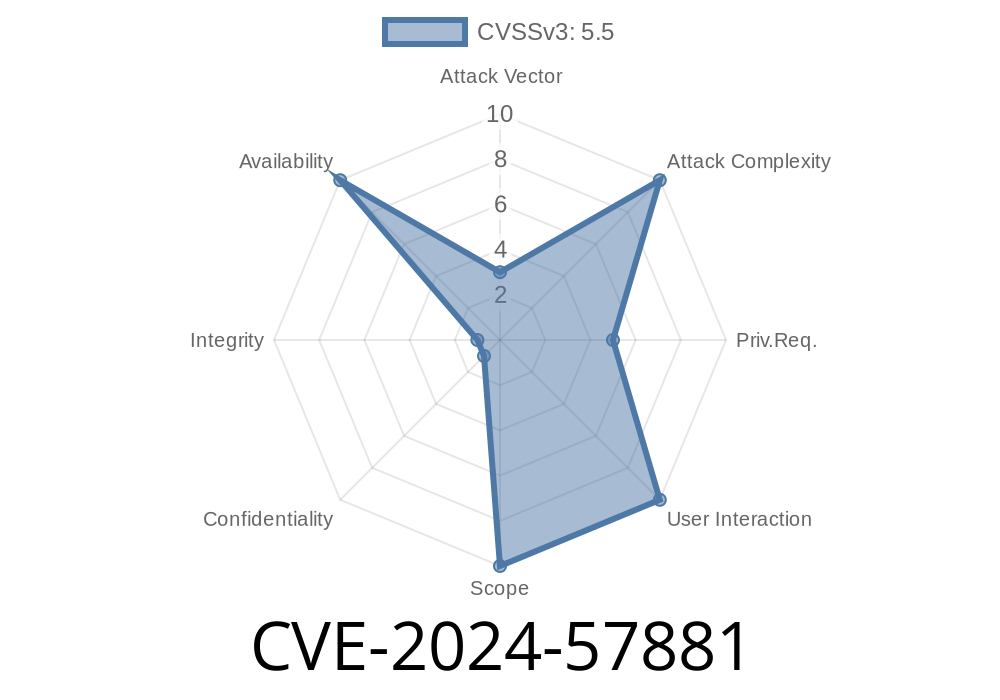A new Linux kernel vulnerability has been patched under the identifier CVE-2024-57881. This vulnerability revolved around improper handling of physical frame number (PFN) to page conversions within the mm/page_alloc.c subsystem—specifically, in the split_large_buddy() function. If left unpatched, this could cause invalid memory access and potentially kernel crashes on systems that use certain memory configurations.
In this article, we’ll break down what happened, show you relevant code, offer exploit context, and point you to further resources.
What’s the Issue in Simple Terms?
The Linux memory management code uses the concept of PFNs to keep track of physical memory blocks. When the kernel needs to operate on a memory page, it often converts a PFN (just a number) to a pointer to a struct page with the function pfn_to_page().
But not all PFNs actually represent real memory—especially at the physical edge of memory on some systems (think weird server setups or embedded hardware with gaps in RAM). In rare cases, the code tried to do this conversion for a PFN that didn’t actually exist, which triggered a dangerous NULL pointer dereference.
What does that mean?
The kernel would try to “look up” a RAM page that wasn’t there. If unlucky, this could cause a crash (kernel panic) or, possibly, be exploited.
Systems with SRAM configurations that present edge-case memory sections
That means general-purpose Linux desktops or servers may not hit this often—but specialized devices or servers with custom memory layouts could.
Vulnerable Code Breakdown
The issue sits in the split_large_buddy() function. Here’s a simplified version of the problematic code pattern:
// mm/page_alloc.c
static void split_large_buddy(struct zone *zone, struct page *page, unsigned int order, int migratetype)
{
unsigned long pfn = page_to_pfn(page);
for (i = ; i < (1 << order); ++i, ++pfn) {
struct page *p = pfn_to_page(pfn); // <-- Danger! pfn might not exist
// ... do something with 'p'
}
}
The core problem is, on the *first* iteration, pfn_to_page(pfn) is called even though page is already the right pointer. Worse, for some PFNs (at high memory addresses), nothing actually exists to look up.
The Real-World Danger
- Denial-of-Service (crash): If a process triggers memory freeing at just the wrong time—say, unloading a module or device—the kernel may hit this bad code path and kernel panic.
- Local Privilege Escalation: Historically, NULL pointer dereferences in the kernel can sometimes be exploited (particularly on older kernels or those without SMEP/SMAP or usermode mappings at address ), but it’s difficult and architecture-dependent.
No public exploits are known, but this is a good example of why *every* corner-case kernel bug matters.
The Patch: Simple and Effective
Instead of trying to convert PFN to page on every iteration, the patched code skips the first lookup—since we already have the original page pointer for that PFN. Only subsequent iterations call pfn_to_page():
static void split_large_buddy(struct zone *zone, struct page *page, unsigned int order, int migratetype)
{
unsigned long pfn = page_to_pfn(page);
for (i = ; i < (1 << order); ++i, ++pfn) {
struct page *p;
if (i == )
p = page; // Use the pointer we already have!
else
p = pfn_to_page(pfn); // Only call for PFNs we haven't seen
// ... do something with 'p'
}
}
Reference and Links
- CVE Record (MITRE): CVE-2024-57881
- Linux Kernel Patch (lkml.org)
- Upstream Fix Commit
- About Sparse Memory Model in Linux
Exploitation Details
This bug was discovered via code review and as of now, no script-kiddie-ready exploits exist. However, a theoretical exploit would revolve around:
1. Repeatedly allocating and freeing large memory blocks near the edge of available RAM, possibly by using custom kernel modules or specific device drivers.
Crashing the kernel when it tries to convert a non-existent PFN to a page.
3. If kernel NULL pointer dereference exploitation is possible (mainly old Linux setups), this crash could potentially be leveraged for privilege escalation.
Example "Exploit Trigger" (conceptual, not functional!)
// This code does NOT exploit but could be part of a trigger scenario
void *mem = mmap(NULL, block_size, PROT_READ|PROT_WRITE, MAP_ANONYMOUS|MAP_PRIVATE, -1, );
munmap(mem, block_size);
// Repeatedly free memory near the end of RAM
Conclusion: Tiny Bug, Big Impact
CVE-2024-57881 may seem like an obscure memory math issue, but it's a good example of how careful kernel programming must be—one stray PFN conversion can lead to stability or even security problems. Patch availability was quick due to a vigilant developer community and straightforward code logic.
If you maintain Linux kernels for special hardware—update and patch as soon as possible!
Stay secure and keep your systems up-to-date. Think small bugs don’t matter? In the kernel, even a corner-case memory bug can crash your whole world.
Timeline
Published on: 01/11/2025 16:15:24 UTC
Last modified on: 01/20/2025 06:28:47 UTC
